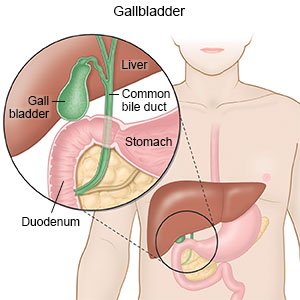Mrcp (Magnetic Resonance Cholangiopancreatography)
Medically reviewed by Drugs.com. Last updated on Aug 4, 2025.
AMBULATORY CARE:
What you need to know about magnetic resonance cholangiopancreatography (MRCP):
MRCP is a type of MRI used to take pictures of your gallbladder, bile duct, and pancreas.
 |
How to prepare for MRCP:
- Your healthcare provider will tell you how to prepare for MRCP. He or she will tell you if you can eat or drink before you have the scan. Tell him or her about all the medicines you currently take. He or she will tell you which medicines to take or not take before the scan.
- If you are a woman, tell your provider if you think or know you are pregnant.
- Tell your provider if you have an implant, such as a pacemaker, defibrillator, stent, insulin pump, or cochlear implant. The magnets may cause harm if you have metal in or on your body. Tattoos, permanent eye liner, and some intrauterine devices (IUDs) may also contain metal. You will also be asked to remove items such as jewelry, a belt, or a hair clip. If you use a medicine patch, remove it before the test. You can put it back on after the MRI.
- Tell your provider if you have ever had an allergic reaction to contrast liquid. Contrast liquid may be given to help blood vessels or tissue show up more clearly.
- Medicines may be given to help decrease anxiety and keep you calm during the MRCP. You may also need medicine to help healthcare providers see your bile duct.
What will happen during MRCP:
- You will lie on a narrow table. You may be given earplugs or headphones to decrease the noise of the MRI. The table will be moved into the hole in the middle of the machine.
- You will hear loud banging or tapping noises as the machine takes pictures. The noise is caused by the magnets in the machine. You will need to lie still during the MRI scan. Healthcare providers may tell you to hold your breath for a few seconds during the scan. When the scan is done, the table will be moved out of the machine.
What to expect after MRCP:
You may be told to drink liquid to help flush the contrast liquid out of your body. Your healthcare provider will tell you how to follow up for the results of your MRCP.
Related medications
Risks of MRCP:
If you have diabetes, your risk for kidney damage may increase if contrast liquid is used. Metal in or on your body may cause a burn or other injury. A metal device may move out of place during the procedure. An MRCP can make medical devices work incorrectly or stop working. You may have short-term hearing loss after an MRI.
Call your local emergency number (911 in the US) if:
- You have a medical device that has stopped working or is not working as it did before the MRI.
Call your doctor or specialist if:
- You have new or increased abdominal pain or other symptoms.
- You have questions or concerns about your condition or care.
Drink liquids as directed:
Liquids will help flush the contrast liquid out of your body. Ask how much liquid to drink, and which liquids are best. Some foods, such as soup and fruit, also provide liquid.
Follow up with your doctor or specialist as directed:
Write down your questions so you remember to ask them during your visits.
© Copyright Merative 2025 Information is for End User's use only and may not be sold, redistributed or otherwise used for commercial purposes.
The above information is an educational aid only. It is not intended as medical advice for individual conditions or treatments. Talk to your doctor, nurse or pharmacist before following any medical regimen to see if it is safe and effective for you.
Further information
Always consult your healthcare provider to ensure the information displayed on this page applies to your personal circumstances.
